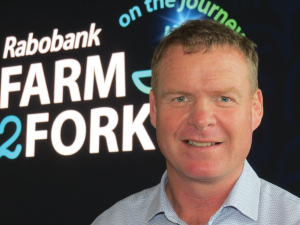The narrative that suggests the only way to reduce agricultural emissions is to reduce food producing is completely wrong and has to change.
That's the view of Rabobank NZ chief executive Todd Charteris. He was speaking to Rural News in Sydney at the bank's recent symposium highlighting the importance of innovation in agriculture to effect the production of more sustainable food.
Charteris says there are billions of people in the world who are underfed and food producers such as NZ need to produce more food - not less - but produce it in a sustainable way. He says increasing yields and doing this sustainably are not incompatible and that there are many new technologies being worked on to achieve this.
"There is a lot of incredibly good work going on to try and find scientific solutions to help farmers and food producers," he told Rural News. "While they are not available yet, I think we need to have the confidence to go and chase those solutions."
This was the theme of the one-day Sydney symposium, Farm 2 Fork, which was attended by most Rabobank staff from Australia and New Zealand - along with farmers, business clients and media from both nations. There were also farmers attending from the USA.
The 1,600 attendees heard from keynote speakers from NZ, the USA, UK, Europe and Australia. All the speakers noted a new world order, both in geopolitical and economic terms, and while the challenges were candidly outlined, the venue oozed with optimism.
Charteris says, while there may have been underinvestment in terms of developing new technologies, there are now positive signs, with the private sector and government collaborating on R&D to crack the agricultural emissions issue. Traditionally, says Charteris, the role of the banks is to help finance the value chain and they are committed to that.
"But another one of our roles is to connect innovators, entrepreneurs and researchers to help solve these problems, for the benefit of farmers and growers on the ground, to wholesale companies and exporters. It's all about connecting farmers with the market."
Charteris says the take-home message from Farm 2 Fork was the optimism and excitement of all the attendees. He says there was an acknowledgement of the challenges, but there was huge focus on the opportunities and people went away highly motivated.
Peter Burke's trip to Sydney to attend the Farm 2 Fork symposium was funded by Rabobank.



















